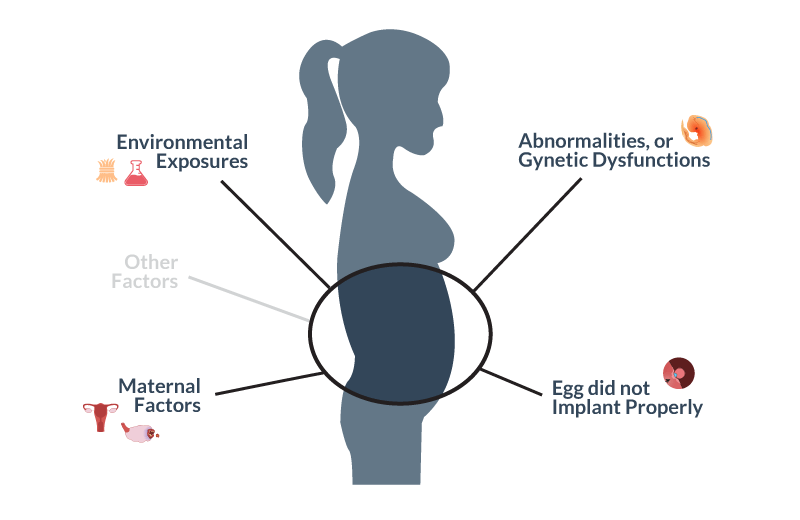Miscarriage is an involuntary, spontaneous loss of a pregnancy before 22 weeks. It happens in up to one third of pregnancies, and is usually seen in the first 12 weeks.
How do you know if you've had a miscarriage?
The key symptom of miscarriage is vaginal bleeding. If you are pregnant and experience any type of vaginal bleeding, it is important that the cause is investigated, so see your doctor as soon as possible. Other than bleeding, pain in your lower belly or back is a common sign.
Am I at risk of having a miscarriage?
The biggest risk factor for spontaneous miscarriage is being older than 45. Having a structural abnormality in your uterus, or having a bleeding disorder can also increase your risk. A history of previous miscarriages, particularly more than three recurrent miscarriages carries with it a high risk of another occurring. Lifestyle factors such as high caffeine and alcohol intake, smoking and obesity also put pregnant women at an increased risk.
What causes a miscarriage?
Miscarriage occurs because the pregnancy is not developing properly. This can be due to fetal abnormalities, maternal factors or environmental exposures. When the body detects an abnormality, it expels the embryo or fetus and the uterine lining out of the vagina, causing bleeding and cramps.
If a genetic dysfunction or mutation is recognized in the developing fetus, a miscarriage can occur as a defense mechanism or because the fetus cannot properly develop. Similarly, if the egg did not properly implant into the uterine lining the natural reaction is to expel the egg, which causes vaginal bleeding and discharge.
Other causes of miscarriage can be due to maternal factors. Illness or infection that causes dysfunction to any part of the reproductive tract (ovaries, fallopian tubes, uterus or vagina) can cause miscarriage.
Medical conditions such as fibroids, uncontrolled diabetes and thyroid abnormalities are also linked to increased likelihood of miscarriage. Other known causes include toxins like radiation and chemotherapy. This is why it is not recommended for pregnant women to undergo X-Rays or CT.
New research has shown that some herbal medicines like aloe vera, bitter lemon and celery have properties that can cause spontaneous miscarriage. As discussed above, lifestyle factors like smoking, alcohol intake and excess caffeine commonly cause miscarriages.

How can you prevent a miscarriage?
Changes to your lifestyle such as quitting smoking and reducing caffeine and alcohol intake are crucial in maintaining a healthy pregnancy and reducing miscarriage risk. Maintaining low intensity exercise and a healthy diet throughout the pregnancy also aid this. Despite making these changes, miscarriages can still occur in healthy pregnancies, but it is important to maintain your lifestyle throughout to ensure your baby's health. See preparing your body for pregnancy.
How do you treat a miscarriage?
Once a miscarriage has begun, nothing can be done to stop it. Medical staff will aim to avoid heavy bleeding and remove any tissue that has not passed, but the miscarriage cannot be reversed.
Expectant treatment involves simply waiting for the tissue to pass naturally. This can take up to a few weeks and involves spotting or bleeding and period like pain. It can help with grieving, but can become worrying if excessive bleeding or a recognizable embryo is seen. This waiting time can take a huge psychological toll and can be very difficult on women and their partners. If you decide to take this treatment method, it is advised you speak with a counselor or psychologist.
Medication can be given to speed up the process of miscarriage so that passing of the tissue occurs within six hours, but does have some side effects. 'D&C' (dilation and curette) involves minor surgery. This is usually done in severe pain, heavy bleeding or if a large amount of tissue remains. D&C involves going through the vagina and manually removing the tissue from the uterus. This procedure usually takes less than 10 minutes but may take up to four hours in hospital due to waiting and recovery time. Learn more about the D&C procedure.
What do you do after a miscarriage?
- Look after your mental health.
- Use sanitary pads and not tampons.
- See your doctor for a check up 4-6 weeks after.
- If you have any pain, you can take painkillers such as Tylenol (paracetamol) to help.
- Different people grieve differently and there is no right way to feel after a miscarriage. The miscarriage may not affect you at all, or it may be very difficult to work through. The most important thing to do is to surround yourself with people that will help you to get through whatever it is you're feeling. Your partner may have emotions very different to yours or may want to try for a second pregnancy right away. Allow yourself to adjust to the loss before attempting anything you're not comfortable with.
If you feel anxious, depressed or need to talk to someone, you can see your doctor, a psychologist or contact a community support group. See the links below for online and telephone support in your area.
International www.babyloss.com
USA www.thehelpline.org/ - 1 866 942 6466
AUSTRALIA www.sands.org.au/index.php/find-support - 1300 072 637
UK www.miscarriageassociation.org.uk/ - 0194 200 799








